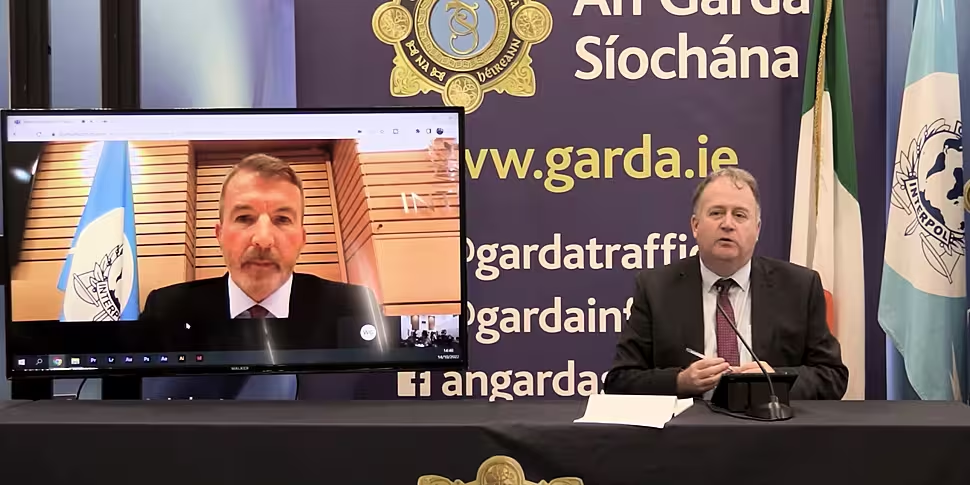Gardaí and Interpol have carried out a joint investigation into the sending of fraudulent e-mails and money laundering.
The enforcement operation, in 14 countries across four continents, is targeting a group known as 'Black Axe' and other related West-African organised crime groups.
Gardaí said on Friday that nine premises were searched in Dublin and Clare; several arrests were made.
Eleven people were arrested and detained under organised crime legislation, and 23 people were arrested for the purpose of charging.
There were also 62 charges of money laundering and three organised crime offences.
The arrests for charging were carried out by local districts such as Tallaght, Tralee, Portlaoise, Navan, Limerick, Cork and Waterford.
Operation Jackal
Led by the Garda National Economic Crime Bureau (GNECB), this period of action began in mid-August.
Operation Jackal marks the first time Interpol has coordinated a global operation specifically against Black Axe, which it said is "rapidly becoming a major security threat worldwide".
Black Axe and similar groups are responsible for the majority of the world's cyber-enabled financial fraud, as well as many other serious crimes.
In South Africa alone, two suspects arrested a fortnight ago were wanted for online scams that extracted US$1.8 million (€1.85 million) from victims.
An INTERPOL team is on the ground in South Africa🇿🇦 this week where two suspected organized crime members were arrested as part of a global operation against large-scale #FinancialCrime 💸
The suspects are wanted for online scams that extracted $1.8 million from victims. pic.twitter.com/jOBv0I02AG— INTERPOL (@INTERPOL_HQ) September 30, 2022
Laundering through Ireland
This investigation began with a request for assistance from an EU country in early 2020, after €1.1 million was stolen in a e-mail fraud and laundered through Asia.
The fake e-mails had originated from Ireland.
Electronic devices seized during the investigation indicated, for the first time, that this criminal organisation was operating from Ireland and not just laundering through here.
To date, investigations can link more than €40 million as having been stolen and laundered.
Money mules
Gardaí say the bank accounts used to launder this money belongs to Irish residents, who are recruited as money mules by what are known as 'mule herders'.
Money mules are recruited through social media or through friends.
It can also see young people with drug debts pay off their debts by allowing their accounts to be used.
Gardaí say money mules are also found in other EU countries and flown to Ireland, where they are given false documents to open accounts and then hand the accounts over to the recruiter.
Italian, British, Portuguese, Maltese, Dutch and Belgian IDs have been identified as used in this way.
Many documents are false, but genuine documents have also been recovered.
'Huge increases'
Gardaí say 13 different people from one specific country flew to Ireland between 2018 and 2020, and opened accounts through which over €2 million was laundered.
New trends also involve Irish people being flown to other EU countries, given fake documents and told to open accounts which are then used to launder funds.
There are also "huge increases" in Irish online banking accounts being used to launder the proceeds of frauds in Eastern and Central Europe, Gardaí add.
An ongoing investigation tied to Operation Jackal, called Operation Skein, has arrested 195 people for money laundering offences and 69 people under organised crime legislation to date - with 135 people charged.









